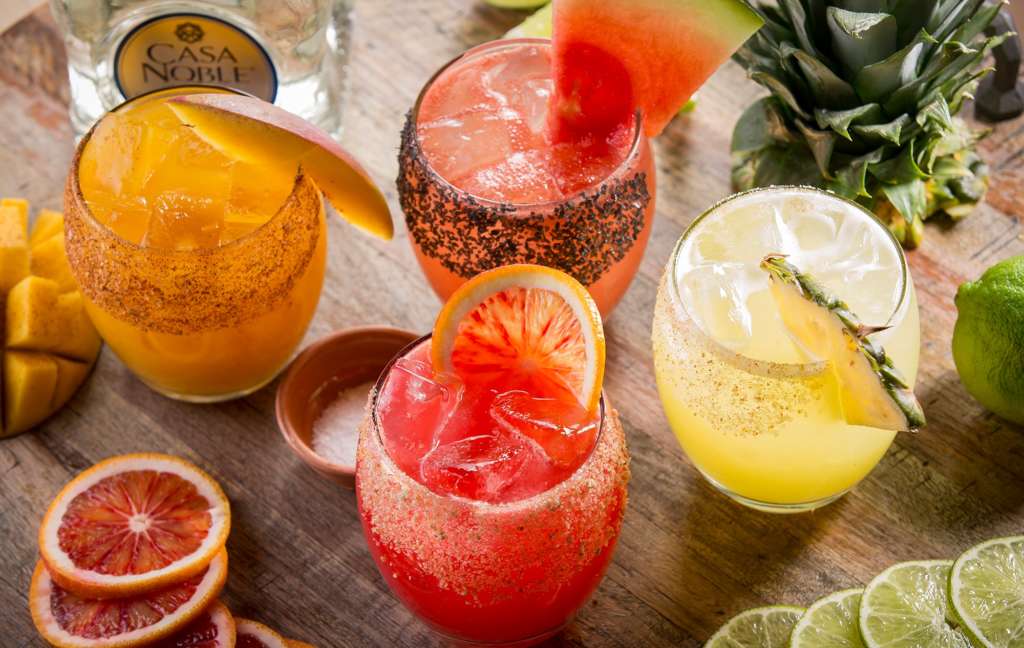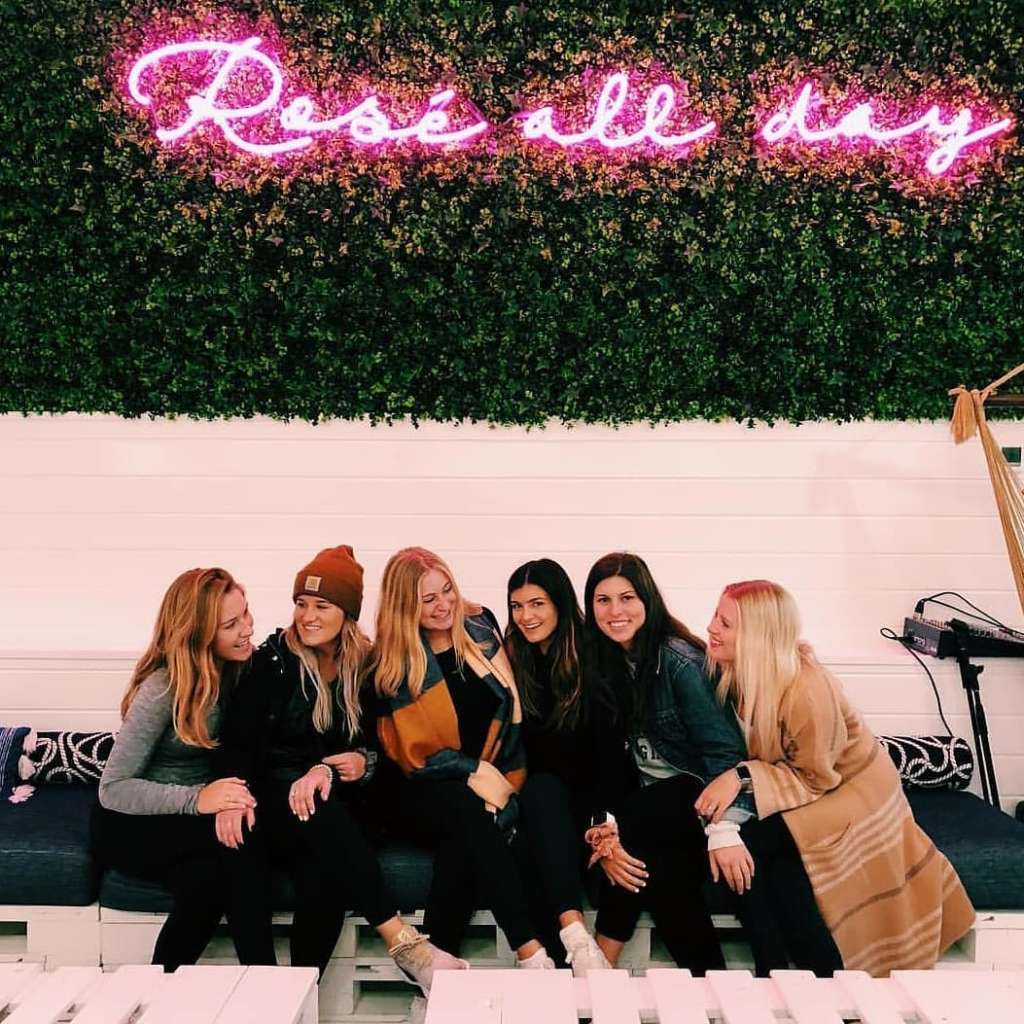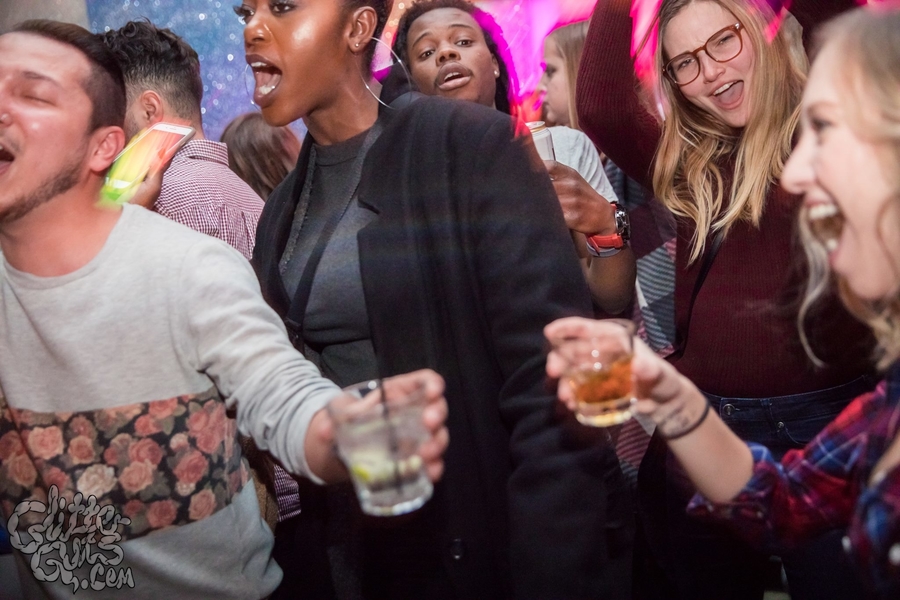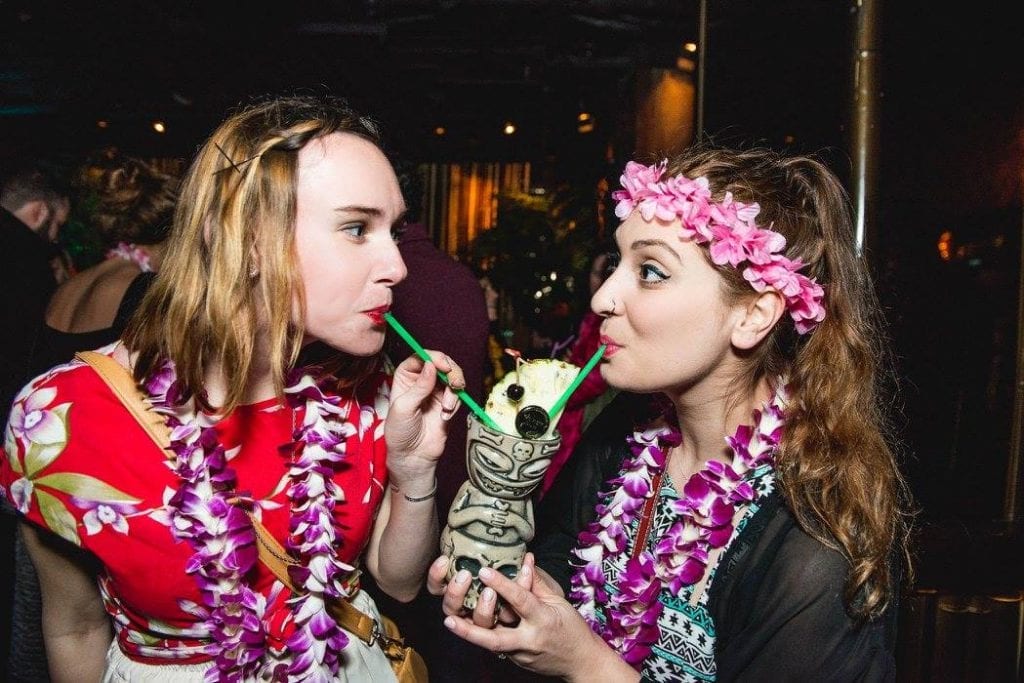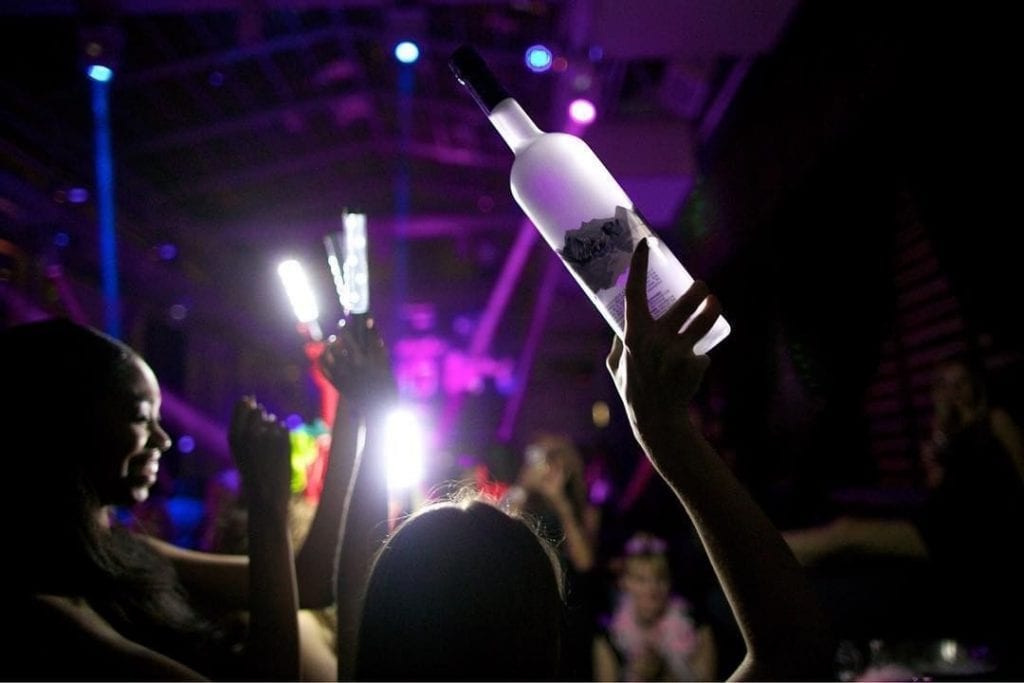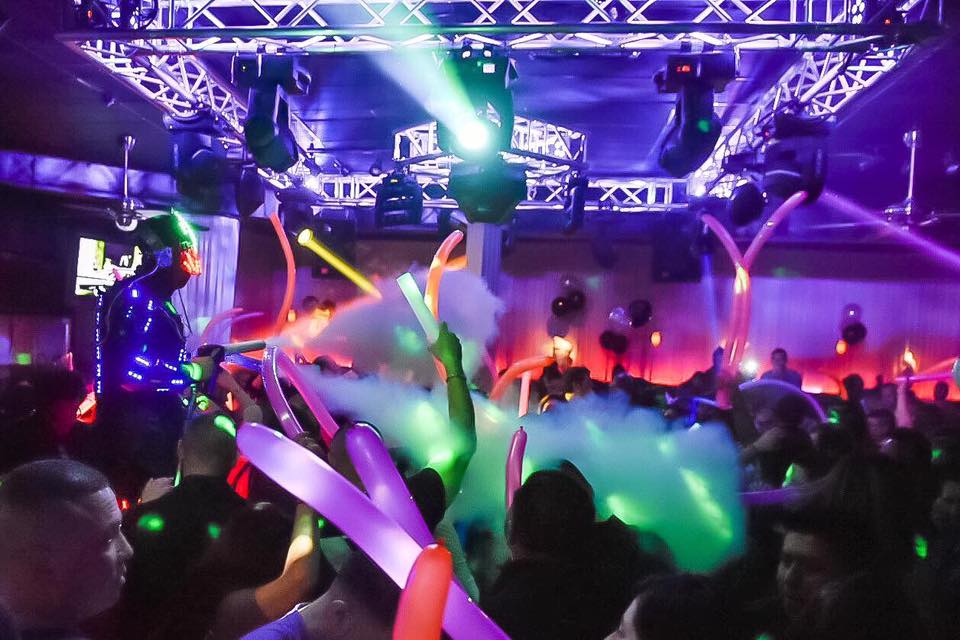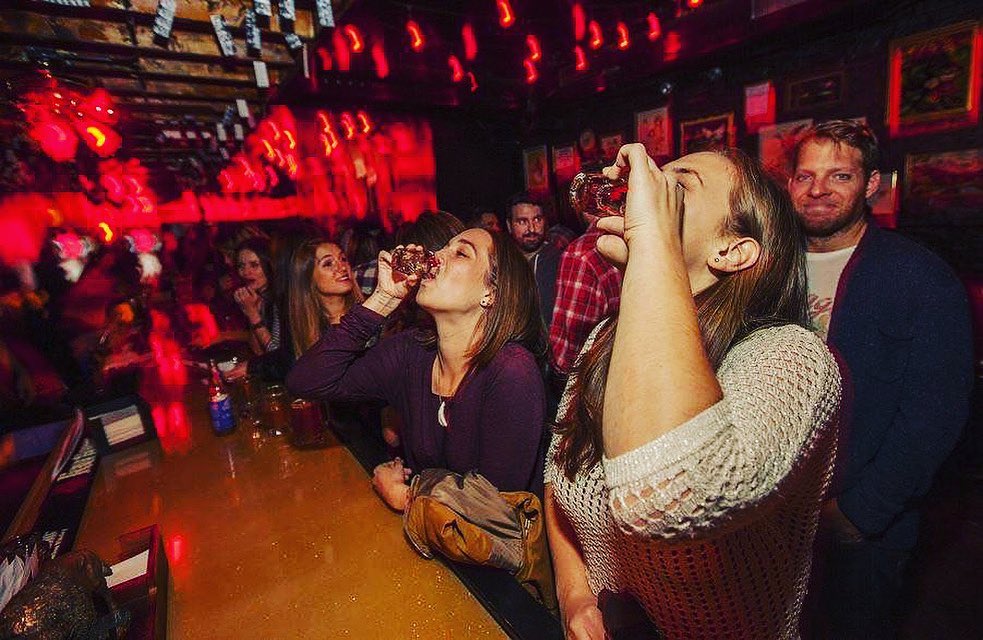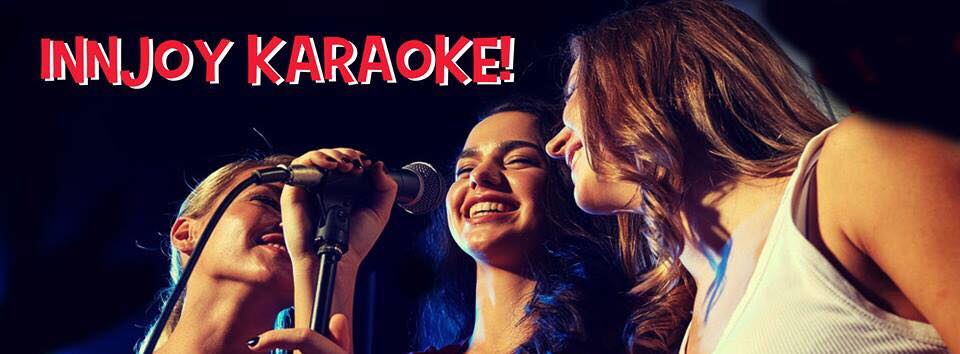It’s a Sunday and the theater is packed, an abnormality for any comedy spot in Chicago. Around 40 people situate themselves in chairs and chat with friends, patiently waiting for the mayhem about to ensue. The space used to be an old clothing store but is now home to the new Lincoln Lodge venue, complete with three theaters, two classrooms, and a bar. The show is Sauteed Stand Up: A Cooking Comedy Competition hosted by Nathan Hall and Tad Walters. Judged by a panel of chefs, two teams of stand-ups face each other head on with their best material, all while cooking a dish of their choice to present the judges.
Lifted from typical cooking show setups, the comics not only run through the motions of their set, but also play within a spoof version of rhythms you might see on Top Chef or Cutthroat Kitchen. Chef Maija Barnes nods her head before choosing a winner. “This one,” she says about the rice pilaf Eggo waffle treat created by Sohrab Forouzesh and Meg Indurti. “This is the plate for me.”
This is one of many shows currently featured at the Lincoln Lodge, an independent comedy theater at 2040 N. Milwaukee, right where Logan Square meets Bucktown. Like many DIY theaters, the space is run by comedians in the scene, artists who have taken it upon themselves to create environments that let “far-from-the-norm” comedy thrive. Tight Five Productions oversees all shows, classes, special events, and building issues that come with the venue but as for actually running and producing the shows, that’s up to a curated group of local cast members familiar with running comedy shows around town, the ones in touch with people from the community.
“The owner, Mark Geary, really wanted independent comedy to still have a space in Chicago,” says lead cast member Deanna Ortiz. “As opposed to other cities that will maybe have one big club that books a couple comics, he wanted to make sure there’s room for everybody to do whatever weird idea they want, like a cooking show where you might start a fire or FreakFest with Megan Stalter.”
Enthusiastic performers have come together in recent years to open independent comedy spots of their own, like Logan Square Improv, Bughouse Theater, and the Juice Box, to name a few. Though all share the same humble beginnings, the Lincoln Lodge has a history that far surpasses its predecessors, producing a long line of steady talent, such as Hannibal Burress, Pete Holmes, and Cameron Esposito. It wasn’t easy, however. The show only recently found a home of its own after 21 long years.
[embedded content]
“A big struggle was when the Lincoln Restaurant, our host venue of 15 years, closed, leaving us homeless,” says Geary. “We spent three years at Subterranean in Wicker Park and two years at the Newport Theater in Wrigleyville before opening our new space and ‘forever home.'”
Tom Lawler had approached Geary about starting a showcase room in the back of the Lincoln Restaurant in 2000. Geary’s production skills from his DIY mike at the Red Lion on Lincoln and Lawler’s innovative marketing savvy were a perfect match for the endeavor. Back then there was barely a stand-up scene, with only a few open mikes and Zanies compared to the much more robust community of today. Many of the showcases were on the south side, thanks to the notoriety of the Compass Players at 55th and College Avenue and clubs like All Jokes Aside in the South Loop and Jokes and Notes at 47th and King Drive–all have since shuttered.
Seeing an opportunity for a weekly show, the two put a spotlight on the up-and-coming comedians hitting mikes every night. The process helped kick-start the careers of many of the major players performing comedy today, half the reason comedians are eager to get involved with the theater.
“We had a lot of comedians before they were famous, people passing through like Nicole Byer,” says Stephanie Weber, a cast member who’s been involved with Lincoln Lodge for six years now. “The people who have performed here is a long, impressive list that would make anyone proud to be a part of this.”
The road to becoming a well-established pioneer, however, was long and filled with lots of trial and error. Between disputes with contractors and City Hall postponing sign-off on projects and plans over the last 18 months, it’s a miracle the doors finally opened in January. Despite years of looking for a venue, Geary never gave up.
“The last two years have been hell,” Geary says. “Luckily we have a benefactor, Ed Toolis, who stuck with us and provided the funding we needed to wade through the nightmare of dealing with the whole process with the city.”
It took the support of many in the community eager to see the Lincoln Lodge thrive to keep the show financially afloat before finding its own home. Through fundraising and donation-based shows, the owners have managed to pool resources to keep the Lincoln Lodge’s name alive.
The show and the venue are not one and the same–the addition of the latter requires a lot more hands on deck. The long-running show has been kept together by its cast members, a rotating group of people tasked with handling what goes into making the Lincoln Lodge perfect. What started off as a showcase at the back of a pancake house has now grown into three theaters, with capacity of 130 people, 80 people, and 30 people. The venue demands more of its cast performers now that simply running lights on a Saturday isn’t enough. They gladly give up their time to the Lodge knowing the opportunities that may come with it.
click to enlarge

“We do menial tasks like setting up chairs, take tickets, bus tables, and we have divided tasks every week that include writing newsletters, social posts, and e-mailing press contacts,” Weber says. “On top of that, the cast rotates performing on the shows every week. We work together to make the show what it is every week.”
Keeping things inclusive is incredibly important to the people at the Lincoln Lodge. In 2016, Lincoln Lodge members emphasized how excited they were to finally have an even ratio of male-to-female cast members. The 20th season features Olivia Perry, Stephanie Weber, Alex Dragicevich, Chris Higgins, Gena Gephart, Britt Ferguson, Kyle Scanlan, Deanna Ortiz, Jarrell Scott Barnes, Jessica Hong, Dan Drees, and Molly Kearney. When deciding who to bring in, the 12 have a strict democratic system where each decides on comics who are doing well or haven’t had enough opportunities to perform.
“Adding producers who are WOC or queer has helped highlight those performers on the show. Having a diverse cast lends to diverse booking,” Weber says. “That’s true for any show or institution. Diversify the people making the decisions, and the decisions will be diverse. Duh!”
“I remember we were at Subterranean, and this woman came up to me after the show and said she was so glad there was a girl on stage because sometimes when she had seen shows there wasn’t many girls,” Ortiz says. “There’s always going to be a person of color in the audience who wants to hear their point of view, and I think that’s something in our bookings that we are so aware of. There are so many great comedians to choose from, we can’t just keep picking the same six people who do well at the Lodge.”
On its first Sunday, Sauteeed Stand Up runs into a few issues at the new Lincoln Lodge. There’s worry of a fire breaking out–two extension cords are destroyed in the process of running two electric griddles, a mini oven, and an induction burner, and a fuse goes out, shutting down the power equipment immediately. The hosts handle it with ease. Then, a heckler gets on stage and challenges comedian Beckett Kenny for his queer material, potentially the worst decision one could make at a show where performers are given knives. The crowd boos the heckler as his friend leads him off stage. Lodge castmates reach out to Kenny after his set to apologize, and the audience applauds once the heckler’s gone. The bartender memorizes his face before he leaves, making sure he will not be let in if he comes back. Things fall apart, but everything is OK in the end. Setbacks can’t stop the energy of the people who have worked so hard to see this through, not when they finally have their own theater.
“We’re good at handling hecklers who get out of control because I know the cast members behind the scenes will help me and have my back in terms of asking people to be quiet,” Ortiz says. “I would hate for people to think the Lincoln Lodge space is somewhere that is not a welcoming space for audience and performers.”
This has always been the way of the Lincoln Lodge, handling situations thrown at them with stride. Finding a venue took almost two decades and yet the dream burned brighter than the letdown. Now the group finally has a physical space to maintain the practice of putting up shows they love in a supportive space for everyone. Life can be hard for a comic testing material, especially if they’re a part of a marginalized community. Even with no security and a tight budget, the Lodge manages to handle concerned patrons, clients, and class members with utmost concern. Here, their home is everyone’s home. v
Read More




